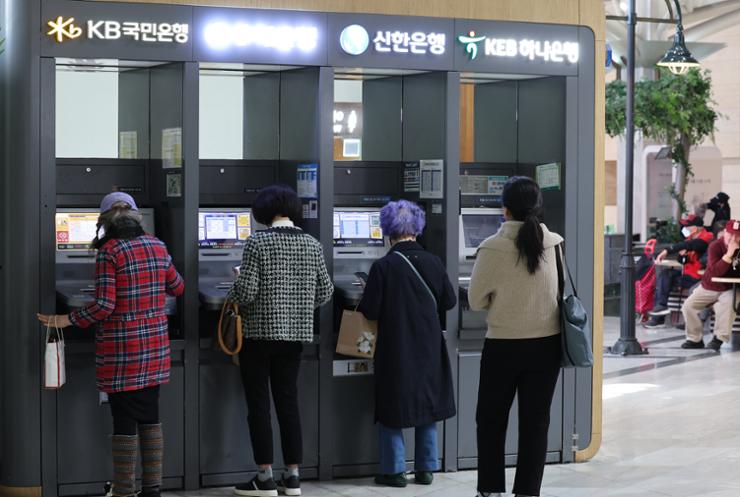
Farmers prepare to plant potatoes in the fields of Gangneung, Gangwon Province, Feb. 27. Yonhap
The government is pushing to amend the Banking Act within the year to introduce a banking agency system aimed at improving accessibility to financial services for digitally marginalized customers, including older adults, the Financial Services Commission (FSC) announced Thursday.
The banking agency system allows third parties to perform core banking services such as deposits, savings, loans and transfers on behalf of banks.
The move comes as the number of physical bank branches continues to decline amid the accelerating digital transformation of the financial industry. The total number of bank branches nationwide dropped from 7,623 in 2011 to 5,794 in 2023.
The country's top financial regulator noted that the decline in physical bank branches is a global trend, driven by the rise of non-face-to-face transactions in the digital era. However, this shift raises concerns about limited financial accessibility, particularly for older adults and other digitally marginalized customers.
According to the FSC's announcement of measures to promote the delegation of banking services, the system will be operated under a licensing framework with restrictions on eligible participants.
Entities eligible to serve as banking agents include banks and corporations in which a bank is the largest shareholder. Additionally, institutions with regional branch networks, such as post offices, mutual cooperatives and savings banks, will also be included.
As amending the Banking Act could take some time, the government plans to first designate the banking agency system as an innovative financial service and conduct a pilot program. The designation is expected as early as July.
Banking agents will be allowed to provide services for multiple banks rather than being restricted to a single institution, though these agencies will not be permitted to represent internet-only banks, which lack physical branches.
Through this initiative, customers, for example, will be able to handle key banking services at approximately 2,500 post offices nationwide.

People use ATMs of four major banks in Seoul, Wednesday. Yonhap
However, banking agents will not be authorized to handle all banking operations. Tasks that require decision-making cannot be delegated, such as credit and collateral assessments for individual borrowers and the determination of interest rates and fees.
Lee Jin-soo, who heads the banking division at the FSC, said banking sector representatives have shown interest in expanding face-to-face services through external channels such as post offices.
"For banks, this initiative offers the advantage of expanding their service channels," he said. "Post offices were also briefed on the policy details and responded positively from the perspective of business and service expansion."
Meanwhile, there is some skepticism about the feasibility of banks acting as agents for one another, as competing banks may have little incentive to sell each other's products.
Regarding this, Lee explained, "The system is designed to allow for such arrangements, but whether it becomes widely adopted will depend on each company's interests and strategic considerations."
The regulator also added that it is working to promote shared ATMs among banks and expand deposit and withdrawal services at convenience stores to further enhance the accessibility of financial services.
 Subscribe
Subscribe E-Paper
E-Paper
